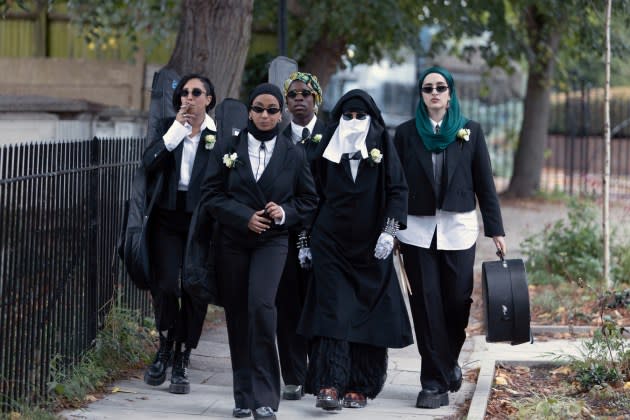‘We Are Lady Parts’ Is Finally Back, Sharper and Funnier Than Ever

It’s been a long time since the world has heard from We Are Lady Parts — whether the fictional all-female, all-Muslim U.K. punk band or the delightful Britcom about the group. The series began streaming on Peacock in June 2021, and it was one of the best shows of that year. That fall, a second season was announced, with enthusiastic quotes from the show’s creator/writer/director Nida Manzoor. And then … radio silence. There was no further news about when, or even if, the second season would arrive until earlier this year. And for a while, it seemed as if We Are Lady Parts was destined to be yet another small show swallowed up by Peak TV.
Finally, though, the new season is here. And it’s my pleasure to report that We Are Lady Parts in no way suffers from second-album syndrome. The new episodes are as funny, catchy, and endearing as the first batch. Whether they would be this good without the gap, or if Manzoor wound up needing this extra time, she has found ways to deepen the characters and their relationships without messing with what worked in mid-pandemic days.
More from Rolling Stone
Paris Hilton and Nicole Richie Will Launch New Reality Series 20 Years After 'The Simple Life'
How to Watch 'Eurovision' 2024: Live Stream the Song Contest Online
Though three years have passed for us, it’s only been a few months for the group. Our narrator, anxious lead guitarist Amina (Anjana Vasan), catches us up on what’s been happening with her, frontwoman Saira (Sarah Kameela Impey), bass player Bisma (Faith Omole), drummer Ayesha (Juliette Motamed), and manager Momtaz (Lucie Shorthouse). After a summer of touring England in a camper van, the band has developed, as Amina puts it, “a following of not insignificant proportions.” They’ve almost become too popular, as their modest success inspires another Muslim punk band, Second Wife, which sets up a millennial vs. Gen Z culture clash, while raising the question of whether the U.K. music scene can support even one act like this, let alone two.
In the midst of this exciting and scary moment for the band, each member has to deal with various personal travails. Ayesha, for instance, is in the honeymoon phase with her new girlfriend, but still wary about coming out to her parents. Amina, meanwhile, has completed her microbiology Ph.D., and conquered the stage fright that once made her vomit while performing in front of an audience. Her newfound confidence inspires her to enter her own “villain era,” and at times, this attitude leads to big deviations from her norm — like her willingness to date a charming white musician. At others, it’s just an ever-so-slightly bolder Amina, like when she writes the season’s first new song, “Jimmy Ate My Yogurt,” where she vents about an annoying coworker, and includes the lyric “I’ll respond to your email at a reasonable hour.”
The first season’s songs hit the sweet spot of being genuinely good but also ridiculous: “Bashir With the Good Beard” made it into the Top 20 of the Rolling Stone list of the best songs performed by fake bands. New numbers like “Jimmy Ate My Yogurt” and the Bisma-penned “Malala Made Me Do It” are in that admirable tradition(*). And the show continues to make tremendous use out of Anjana Vasan’s gift for playing anxiety for laughs, even as it finds new comedic notes for the rest of the ensemble to play, like Sarah Kameela Impey getting an extended slapstick riff when Saira reacts poorly to meeting a musical idol of hers. Even with Vasan still the unquestioned lead, it’s a more egalitarian season all around, and the supporting cast’s work more than justifies this.
(*) “Malala Made Me Do It” is a country song, but both the show and the band have tended to have a very broad definition of what qualifies as punk. And the song leads to a cameo by Malala herself.
But as was the case a season ago, We Are Lady Parts recognizes that there are serious ideas hidden beneath the frequent silliness. Bisma wrestles with some of the conflicting demands of being both Black and Muslim, all of which is played straight (and well). Saira’s idol, meanwhile, dismisses the band’s output as a bunch of “funny Muslim songs” that are wasting the platform they’ve created for themselves. As Saira struggles to write new material that’s more honest and challenging, the other members of the band, as well as various agents and producers who are interested in taking them to the next level, debate whether this is what the audience wants. Bisma makes a convincing argument that the very existence of a band made up of women who look like them is political, while Saira begins to wonder if that’s enough at a time when it can be so precarious to be a Muslim woman in a largely non-Muslim space.
This is a big, self-aware question that Manzoor is having her characters ask one another, and there’s a danger that the funny show about the funny Muslim songs could become too dramatic for its own good. Fortunately, Manzoor is smart enough to raise the questions without drowning the comedy in them.
It’s an excellent, amusing, whip-smart show, and a quick binge, even if you have to start with that first season. It deserves a following that qualifies as bigger than “not insignificant.”
All six episodes of We Are Lady Parts Season Two are now streaming on Peacock. I’ve seen the full season.
Best of Rolling Stone